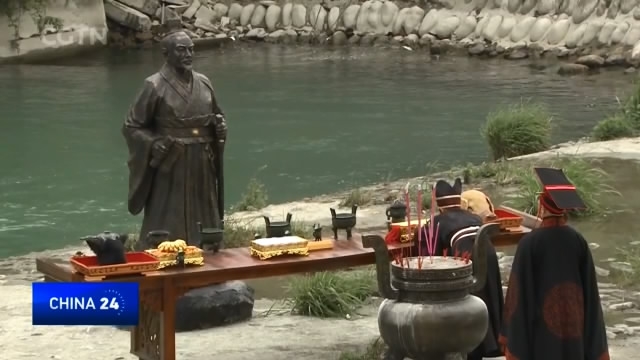
21:03, 04-Apr-2018
Qingming in Dujiangyan: Festival held to celebrate world's oldest irrigation system

The Qingming festival, otherwise known as tomb sweeping day, is a holiday set aside for Chinese people to worship their ancestors. In the southwestern Chinese city of Dujiangyan, people hold festive celebrations in remembrance of one particular ancestor. Some even say it is to him that the Chengdu people owe their famous laid-back attitude of life. CGTN's Xu Mengqi has the story.
A festive celebration in honor of an engineering feat.
It's a tradition that goes back more than a thousand years here in Dujiangyan, a city in Southwestern China, known for its irrigation system.
WANG GUOPING SICHUAN CULTURE SCHOLAR "The Dujiangyan irrigation system has stood for more than two thousand years. It is still functioning, and benefiting an even greater number of people. This is a miracle in the entire hydraulic history of the world."
A miracle that is now a UNESCO World Heritage Site.
Located in the western part of the Chengdu Plain, the irrigation system is the brain child of Li Bing, a local official who was tasked with controlling the frequent flooding in this area at around 274 BC.
Li Bing had to keep the waterway open for military vessels, so a dam was out of the question. Instead, he came up with the idea to build a weir works system.
The first key component of the system is called the Fish Mouth Levee, which divides the Minjiang river into inner and outer streams; then there is a 200 m-wide opening called the Flying Sand Floodgate, which ensures against flooding by utilizing natural hydrological features and carrying over excess water from the inner to the outer stream.
XU MENGQI DUJIANGYAN, SICHUAN "The narrow waterway behind me on my right is named the Bottle-Neck Channel, which Li Bing created by gouging through this mountain. It is the final part of the weir works system and it is from here the inner stream of the Minjiang River flows into the Chengdu flatlands. Together with the fish mouth levee and the flying sand floodgate, it ensures the water flow is stable and constant."
The completion of the system brought an end to flooding in the area and turned Sichuan into a thriving and productive agricultural region in China.
PATRICK ERWIN, PRINCIPAL WASHINGTON D.C. LINCOLN HIGH SCHOOL TOURIST "It's just remarkable to look at it online and read the history and to see everything that happened so long ago, you are talking about the vision that somebody had that made this a robust part of the world, they did a great job."
WANG GUOPING SICHUANESS CULTURE SCHOLAR "The whole construction and expansion of the irrigation system was following nature's law. It achieves a harmony between humans and nature."
For locals and tourists, the festival was not only a tribute to the great engineer Li Bing, but also an exciting chance to see for themselves the ancient technique of water flow control.
TANG PEIXUAN TOURIST "The actors put on a really good performance, particularly the water releasing part, when the wooden tripods were cut open. It was truly impressive."
Using cost-effective and readily-attainable local materials such as stone, bamboo and wood, Dujiangyan still observes the ancient way of maintaining the levee and controlling water flow.
An engineering marvel indeed, the irrigation system still amazes tourists from around the world. Xu Mengqi, CGTN, Dujiangyan, Sichuan province.

SITEMAP
Copyright © 2018 CGTN. Beijing ICP prepared NO.16065310-3
Copyright © 2018 CGTN. Beijing ICP prepared NO.16065310-3